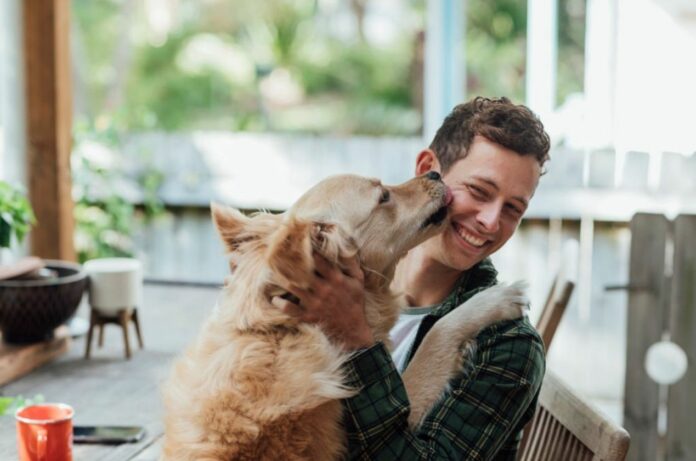The silent danger of antibiotic resistance: Why you should think twice before letting your dog lick your face or sharing food. Experts warn of the potential risks posed by pets
A recent study has shown that allowing your furry friend to lick your face can increase the risk of spreading antibiotic resistance. Health experts advise pet owners to avoid kissing their pets and to refrain from letting them consume food from their plates. Additionally, they recommend washing hands thoroughly after stroking or picking up after their pets.
Antibiotic resistance is a significant concern for humanity, with common drugs losing their efficacy against evolving pathogens, resulting in the emergence of “superbugs.”
A Lancet study from last year revealed that over a million people died from such superbugs in 2019.
While overprescription and misuse of antibiotics have been identified as significant issues in the Western world, researchers have now highlighted the possible role of domestic pets in the spread of disease.
The study suggests that healthy dogs and cats could carry multidrug-resistant organisms, making them potential carriers for hospitalised owners. Similarly, humans could transmit dangerous microbes to their pets.
Dr. Carolin Hackmann with colleagues from Charité University Hospital Berlin, Germany, conducted a study on more than 2,800 hospital patients and their companion animals.
“Our findings verify that the sharing of multidrug-resistant organisms between companion animals and their owners is possible,” adds Dr. Hackmann. “However, we identified only a handful cases suggesting that neither cat nor dog ownership is an important risk factor for multidrug-resistant organism colonisation in hospital patients.”
The worldwide concern regarding pets acting as potential reservoirs for multidrug-resistant organisms (MDROs) is increasing. Antimicrobial resistance occurs when microbes such as bacteria, viruses, or fungi evolve and become resistant to the drugs designed to kill them. According to estimates, almost 1.3 million deaths were caused by antimicrobial-resistant infections and were associated with nearly 5 million deaths globally in 2019.
In this case-control study, researchers aimed to determine whether pets, specifically cats and dogs, contribute to the transmission of MDRO infections among hospital patients. They focused on the most prevalent superbugs affecting hospital patients, including methicillin-resistant Staphylococcus aureus (MRSA), vancomycin-resistant enterococci (VRE), third-generation cephalosporin-resistant Enterobacterales (3GCRE), and carbapenem-resistant Enterobacterales (CRE), which are known to resist multiple antibiotics, including penicillin and cephalosporins.
From June 2019 to September 2022, researchers collected nasal and rectal swabs from a total of 2,891 hospitalised patients at Charité University Hospital Berlin. Of these patients, 1,184 had previous colonisation or were colonised on admission, while the remaining 1,707 were newly admitted controls. The researchers also obtained swabs from any dogs and cats that lived in the patients’ households.
The samples were analysed using genetic sequencing to identify the bacteria species and the presence of drug resistance genes. Whole genome sequencing was also used to confirm potential transmission of resistant bacteria.
Additionally, participants were asked about well-known risk factors for MDROs, such as recent infections or antibiotic use, previous hospital stays, and the presence of urinary or central venous catheters. The researchers also collected information on the number of pets in the household, the level of closeness between the pets and patients, and the health status of the pets.
The study found that 30% (871/2,891) of hospital patients were MDRO-positive, while 70% (2,020/2,891) were MDRO-negative. Of those who tested positive, 11% (93/871) owned dogs and 9% (80/871) owned cats. In the MDRO-negative group, 13% (267/2,020) owned dogs and 13% (253/2,020) owned cats.
All 626 pet owners were asked to provide throat and stool swab samples from their pets. Out of the 400 samples received from 300 pet owners, 15% (30/203) of dogs and 5% (9/197) of cats tested positive for at least one MDRO. In four cases, the MDROs matched phenotypically between the pets and their owners, indicating potential transmission.
Whole genome sequencing was used to confirm that only one pair of matching MDROs, found in a dog and its owner, were genetically identical. The matching pathogen was 3GCR Escherichia coli, which is commonly found in the intestines of healthy people and animals.
“Although the level of sharing between hospital patients and their pets in our study is very low, carriers can shed bacteria into their environment for months, and they can be a source of infection for other more vulnerable people in hospital such as those with a weak immune system and the very young or old,” adds Dr. Hackmann.
It’s important to note that this study is observational and does not establish a causal relationship between close contact with pets and MDRO colonisation. Rather, it suggests the possibility of co-carriage, and the direction of transfer remains unclear.
The study has several limitations, including the potential for under-reporting of MDRO colonisation in pets due to issues with swab sample collection, which was conducted by the pet owners themselves.
Additionally, the study’s findings are specific to hospital patients in an urban area and may not apply to the general population or high-risk groups for MDRO, such as livestock farmers.
The findings are being presented at this year’s European Congress of Clinical Microbiology & Infectious Diseases (ECCMID) in Copenhagen, Denmark (15-18 April).
Image Credit: Getty
